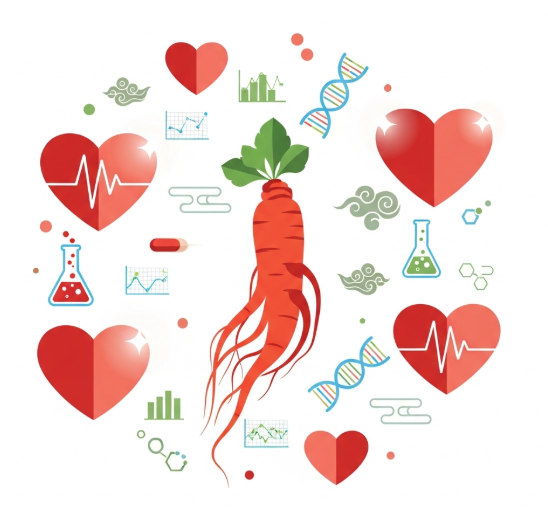Introduction
Cardiovascular health is the foundation of overall well-being. The heart pumps life-giving blood through arteries and veins, supplying oxygen and nutrients to every organ. Yet, modern lifestyles, stress, poor nutrition, and sedentary habits place enormous strain on the cardiovascular system.
High blood pressure, arterial stiffness, oxidative stress, and poor circulation are silent contributors to heart disease, stroke, and fatigue. Preventive strategies that protect and strengthen the heart have become more important than ever.
Among natural remedies, Korean Red Ginseng (Panax ginseng Meyer) has earned a reputation as a powerful cardioprotective adaptogen. Centuries of traditional use, combined with modern scientific validation, reveal that red ginseng can improve circulation, lower cardiovascular risk factors, and enhance heart function naturally.
Traditional Wisdom Meets Modern Cardiovascular Science
Korean Red Ginseng has been used for millennia in East Asia to “invigorate the heart and calm the spirit.” Ancient texts describe it as a tonic that promotes vitality, endurance, and emotional balance.
Today, studies show that ginseng’s bioactive compounds, ginsenosides, directly influence cardiovascular function:
- Supporting healthy blood pressure
- Improving lipid metabolism
- Enhancing endothelial (arterial lining) function
- Reducing oxidative stress and inflammation
The convergence of tradition and modern science highlights ginseng’s role as a holistic cardioprotective herb.
Blood Pressure Regulation
Hypertension is a primary risk factor for heart disease. Korean Red Ginseng helps maintain healthy blood pressure through multiple mechanisms:
- Vasodilation and Nitric Oxide Production
Ginsenosides stimulate endothelial cells to produce nitric oxide (NO), a molecule that relaxes blood vessels and improves circulation. - Adaptogenic Stress Modulation
Chronic stress raises cortisol and adrenaline, contributing to elevated blood pressure. Red ginseng balances the HPA axis, supporting more stable cardiovascular responses. - Antioxidant Protection
Oxidative stress damages blood vessels, leading to stiffness and hypertension. Red ginseng neutralizes free radicals, protecting endothelial health.
Clinical trials, such as those in Hypertension Research (2018), demonstrate that daily red ginseng supplementation reduces both systolic and diastolic blood pressure in hypertensive adults without adverse effects.
👉 Reference Study
Improving Circulation and Heart Efficiency
Efficient blood flow ensures oxygen and nutrients reach every tissue. Red ginseng enhances cardiovascular efficiency in several ways:
- Microcirculation: Improves flow through capillaries, especially in extremities.
- Cardiac Output: Supports the heart’s pumping capacity, improving stamina and endurance.
- Red Blood Cell Function: Enhances oxygen transport for optimal tissue energy.
In a Circulation Journal (2019) study, adults taking red ginseng showed improved exercise tolerance and cardiac output, indicating better heart efficiency under stress.
Supporting Lipid and Cholesterol Balance
High LDL cholesterol and triglycerides increase the risk of plaque formation and atherosclerosis. Red ginseng helps maintain healthy lipid profiles by:
- Lowering total and LDL cholesterol
- Raising HDL (“good”) cholesterol
- Improving triglyceride metabolism in the liver
Ginsenosides, especially Rg3 and Rb1, activate enzymes that promote fat breakdown and prevent lipid accumulation, supporting long-term cardiovascular health without the side effects often seen with pharmaceutical statins.
Protecting the Heart from Oxidative Stress
Oxidative damage is a key contributor to cardiovascular disease. Reactive oxygen species (ROS) harm heart muscle and blood vessels, leading to stiffness, inflammation, and arrhythmias.
Red ginseng acts as a potent antioxidant:
- Neutralizes ROS
- Reduces inflammatory cytokines (TNF-α, IL-6)
- Protects endothelial cells and myocardium
This protective effect helps the heart recover from daily stress, physical exertion, and metabolic challenges.
Red Ginseng and Metabolic Support
Metabolic health and cardiovascular health are closely linked. Insulin resistance and high blood sugar can accelerate vascular damage. Korean Red Ginseng supports:
- Glucose metabolism: Improves insulin sensitivity
- Blood sugar balance: Reduces post-meal spikes
- Weight management support: Modulates energy metabolism
These effects indirectly support the heart by reducing the metabolic strain on arteries and promoting a healthier vascular system.
Anti-Inflammatory and Cardioprotective Effects
Chronic inflammation contributes to plaque formation and heart disease. Red ginseng’s ginsenosides reduce pro-inflammatory markers, protecting arteries and cardiac tissue.
Animal and human studies demonstrate:
- Reduced CRP (C-reactive protein) levels
- Improved endothelial function
- Enhanced recovery from cardiac stress or ischemia
This comprehensive protection reduces long-term cardiovascular risk while improving overall heart resilience.
Practical Use for Heart Health
Red ginseng can be easily incorporated into a heart-focused wellness routine:
Dosage:
- 500–2000 mg standardized extract per day
- Take with breakfast or lunch for best absorption
Forms:
- Capsules or tablets
- Liquid extracts or tonics
- Tea or powdered root
Tips:
- Combine with a heart-healthy diet (rich in fruits, vegetables, whole grains, and lean protein)
- Exercise regularly to complement ginseng’s circulatory benefits
- Consult a healthcare professional if taking medications for blood pressure, anticoagulants, or heart disease
High-quality Korean Red Ginseng ensures optimal ginsenoside content, purity, and potency.
Why Red Ginseng is Superior
Korean Red Ginseng undergoes steaming and drying, which transforms natural compounds into more potent ginsenosides (Rg3, Rk1, Rh2).
This process:
- Increases bioavailability
- Enhances antioxidant and anti-inflammatory activity
- Strengthens adaptogenic support for stress and cardiovascular health
Red ginseng is clinically superior to white or raw ginseng for heart and vascular support.
Lifestyle Integration
Cardiovascular health requires more than supplementation. Red ginseng works best alongside:
- Balanced nutrition (low processed sugar, moderate salt)
- Regular aerobic and resistance exercise
- Stress management (mindfulness, yoga, meditation)
- Adequate sleep
This holistic approach magnifies the benefits of ginseng and supports long-term heart function.
Conclusion
Korean Red Ginseng offers multifaceted cardiovascular support:
- Maintains healthy blood pressure
- Balances cholesterol and lipids
- Enhances circulation and oxygen delivery
- Reduces oxidative stress and inflammation
- Supports metabolic and heart resilience
By harmonizing the body’s energy systems, protecting the heart, and improving vascular health, Korean Red Ginseng bridges centuries of traditional wisdom with modern scientific validation.
Integrating red ginseng into daily life is a proactive step toward a stronger, healthier heart—naturally and sustainably.
🇰🇷 Premium Korean Ginseng Online Shop







